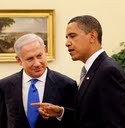Over the past week, the Obama administration's position on Israel exhibited what, in U.S. domestic political terms, amount to tectonic shifts. First, at the Nuclear Non-Proliferation Treaty review conference last week, the United States chose not to block language that identified Israel's undeclared nuclear program as a barrier to stemming proliferation in the Middle East. Then, earlier this week, Washington permitted a U.N. Security Council presidential statement condemning the Gaza flotilla incident to go forward. When combined with public and direct criticism a few months back of Israel's settlements policy, it adds up, in the eyes of many U.S. politicians and pundits, to President Barack Obama "throwing Israel under the bus" and abandoning a key ally. And as Daniel Henninger at the Wall Street Journal argued, when the U.S. criticizes Israel, it "lowers the threshold" for others to do so.
Democrats in Congress have criticized the president's attempts at a "nuanced" stance. Rep. Gary Ackerman, who chairs the House Foreign Affairs subcommittee on the Middle East, argued against "holding Israel to an unacceptable double standard." In assessing the recent actions of the administration, the Cleveland Plain-Dealer concluded, "That's the kind of switch the world notices: An ally gets a push, while an enemy gets a pass."
The Charleston Post-Courier editorialized that this is the wrong approach to take: "The best way to encourage democratic nations to take a chance on peace is to make their citizens feel secure within their own borders. President Obama's diplomacy appears to be having the opposite effect."
But what is seen at home as major, dramatic changes in terms of U.S. solidarity with and support for Israel are viewed overseas as relatively anemic, cosmetic changes. The U.N. Security Council statement that so many in the U.S. have condemned the administration for permitting in the first place was also heavily criticized in other parts of the world because the United States was able to "dilute" its language, focusing on the narrow tragedy of the incident rather than on the larger question of Israel's enforcement of a blockade against Gaza. Senior U.S. officials, including Speaker of the House Nancy Pelosi and Vice President Joe Biden, have also reiterated U.S. support for Israel's position.

